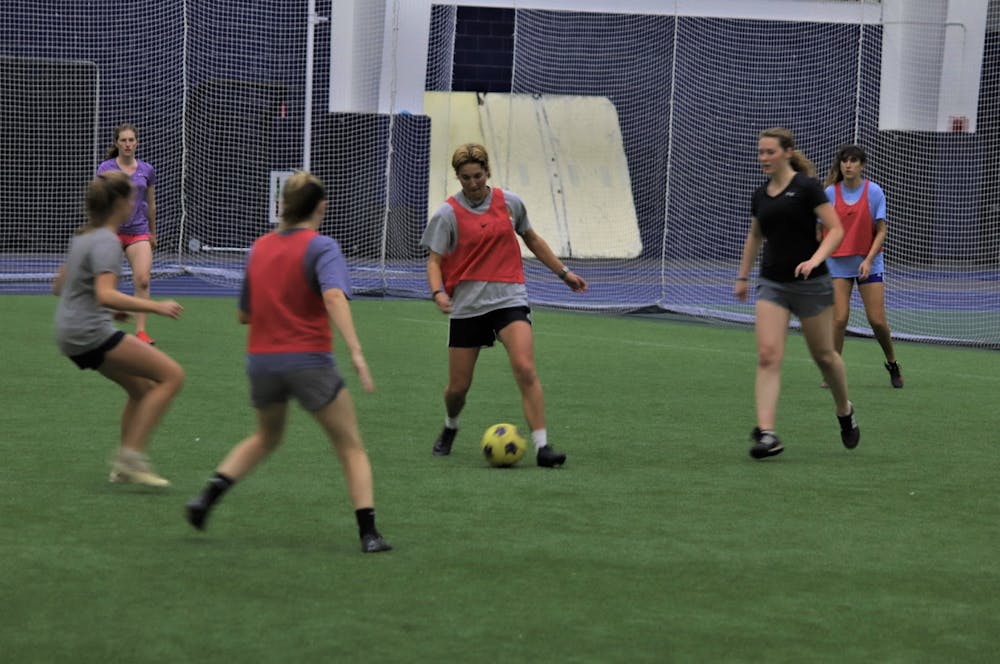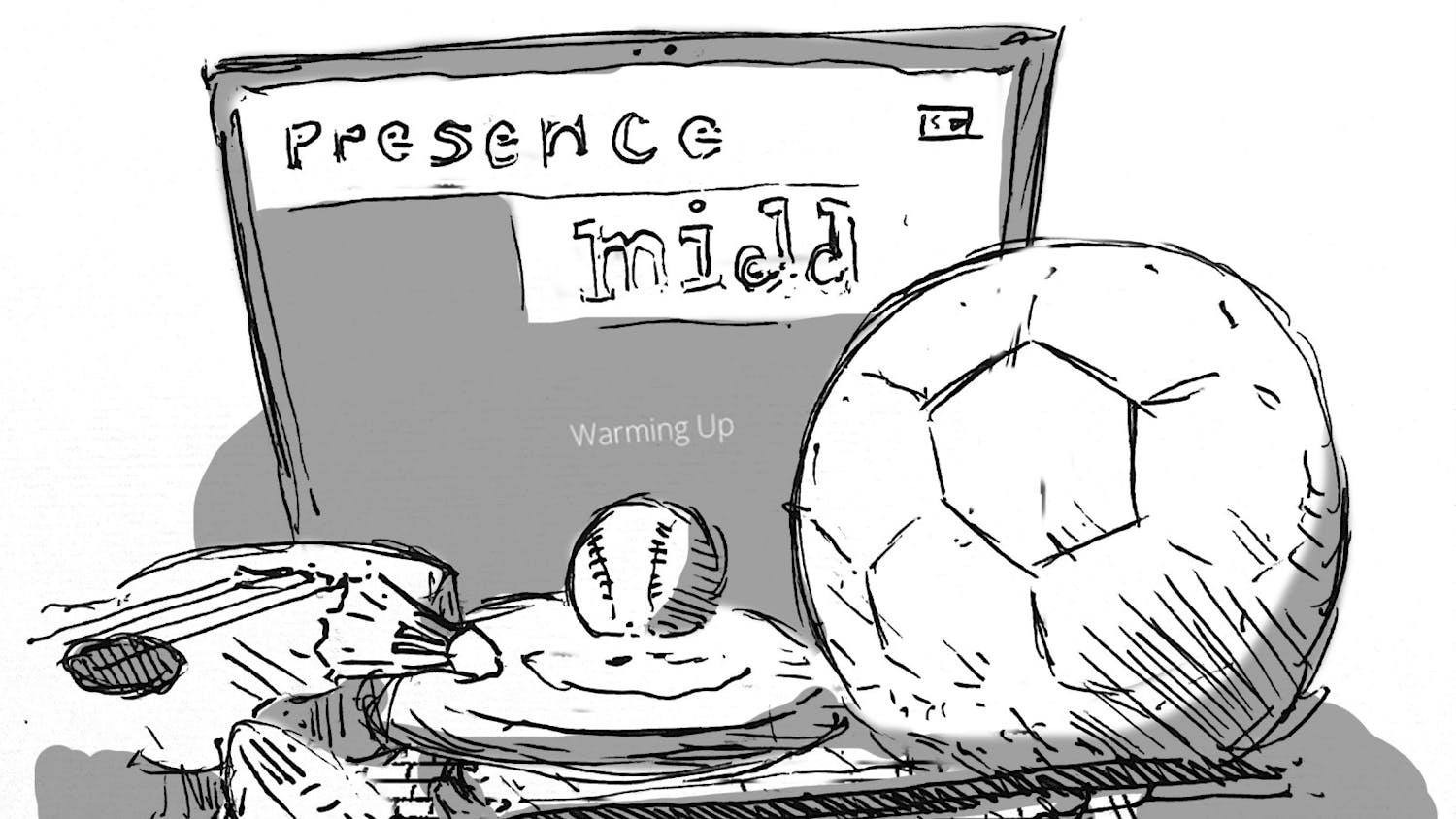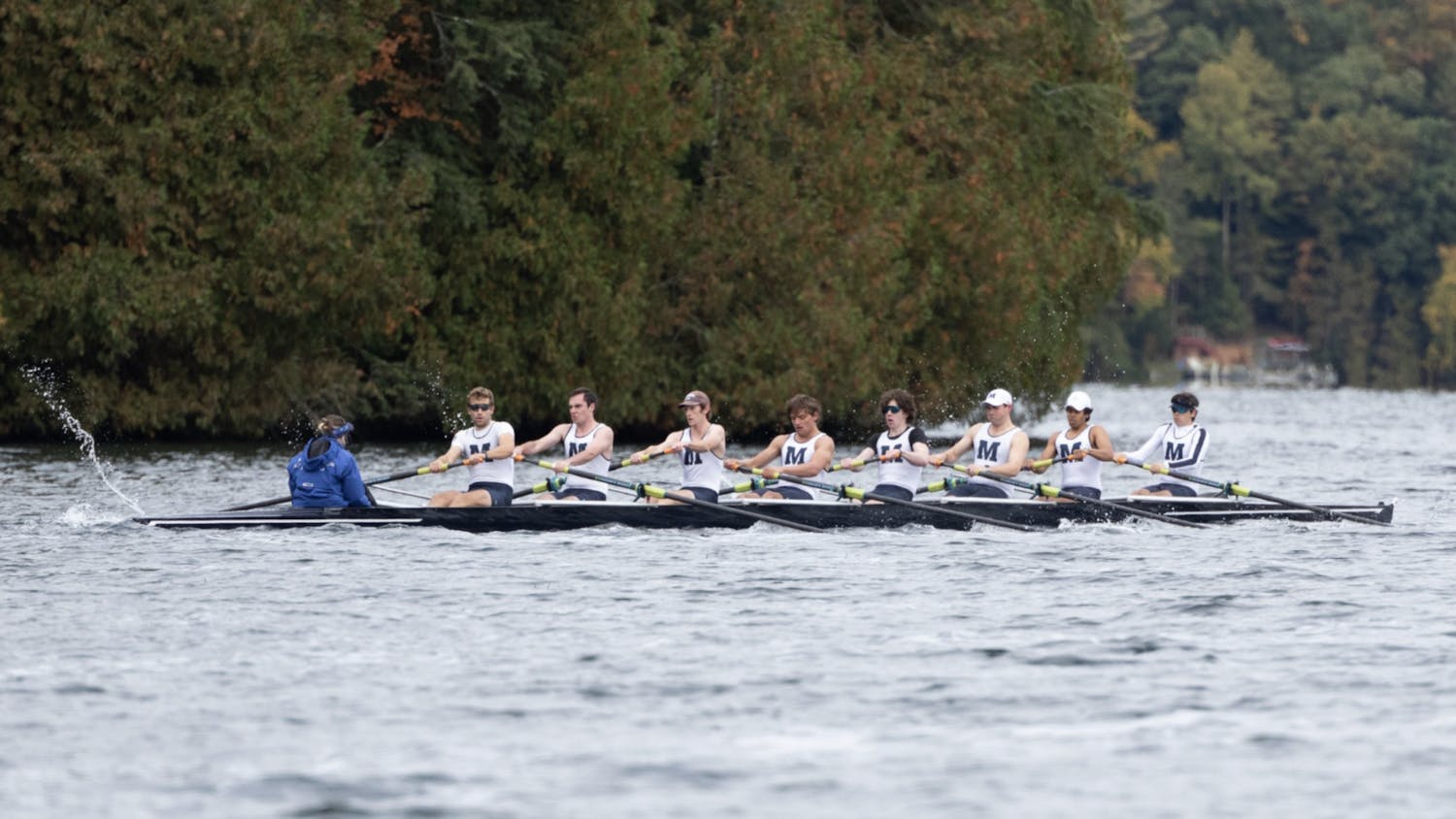Update 01/05/2023: According to Blaise Siefer ’23.5 and Marco Fengler ’23.5, last year’s men’s team co-presidents, the men’s team paid out of pocket for jerseys. The SGA Finance Committee approves budget lines for jerseys on a case by case basis.
Siefer and Fengler asked women’s team captain Eleanor Pontikes ’22.5 last academic year if the women’s team needed funding for the upcoming year (2022–23), and Pontikes said at the time that the team had no expenses in mind. Pontikes told The Campus that women’s team leadership lacked access to resources — including access to Presence, league information and contacts, and contacts for referees or EMTs — that would have allowed her to make a request herself or determine what expenses the women’s team might have in the following year. Pontikes said that last year the women’s team only planned away games, where they would not incur fees for referees or on-site EMTs, because they did not know how to plan home games.
Siefer and Fengler said there was a misunderstanding regarding Presence admin access for the women’s team captains. They believed that the Student Activities Office needed to give the women’s captains admin access to the club Presence page. Current admin are able to grant admin access to organization members.
--
The Middlebury women’s club soccer team brought complaints to the Title IX Office last spring regarding the Student Activities Office’s (SAO) refusal to grant them official club status separate from the men’s team, where captains said club funding was not being distributed to them. While the current captains of the women’s team expressed frustration about the lack of shared resources between the teams, they told The Campus that their main concern was how the situation was handled by college employees.
Middlebury Club Soccer (MCS) was founded as a co-ed organization in fall 2021. While the men’s team applied to join a competitive league in the spring ahead of their fall 2021 official start date, the women’s team did not join a league until this fall. But even though they were not part of a league last year, the women’s team still competed against Dartmouth, Amherst and other teams in the area, according to current Co-Captain of the Women’s Team Eleanor Pontikes ’22.5.
The current captains of the women’s team, Pontikes and Emily Ribeiro ’24, said the team did not receive funding throughout last year. Pontikes told The Campus the women’s team paid out of pocket for travel costs for games during the 2021–22 academic year, and they could not host home games because they did not have funds to pay for referees and EMTs. They also struggled to find funding for jerseys and to come up with funds for the league fee in May 2022 for their fall 2022 season. The team secured jerseys through Varsity Women’s Soccer Coach Peter Kim but “did not have the means to pay him back,” according to Pontikes. Pontikes said she and Ribeiro met with the SAO last week to discuss the issue and make a plan to repay Kim.
Blaise Siefer ’23.5 and Marco Fengler ’23.5 founded the co-ed team in 2021 after a two-year process to get the team off the ground. Though the club was co-ed, Siefer and Fengler said the men’s and women’s teams developed at different rates and therefore joined competitive leagues at different times. Siefer and Fengler intended to have separate men’s and women’s branches for league competition while maintaining a co-ed club for practices, social events and other club activities. The college is also required to offer equal opportunities for participation in sports for men and women under Title IX.
Student organization budgets are distributed by the Student Government Association Finance Committee (SGAFC), and SAO’s Student Organization Handbook states that all new organizations, such as Middlebury Club Soccer in the 2021–22 academic year, can receive a maximum of $1,000 initial allocation for the year. The SGAFC also has deadlines for making “new money requests” in the fall and spring semesters, after which organizations can no longer apply for more funds. The leadership of the men’s team made several “new money requests” through the SGAFC to cover expenses beyond the $1,000 initial allocation, which covered games and travel for the men’s team and a co-ed banquet, all of which totalled approximately $7,000 according to Fengler.
Ribeiro and Pontikes said the women’s team did not receive any of these funds, and the two teams did not come up with a formal process for splitting funds until this academic year.
Siefer and Fengler, the founders of MCS, were the listed officers on the club’s Presence page last academic year, meaning they were the only members of the co-ed organization who could see all of the club’s budget information due to Presence’s admin permission structure.
Pontikes noted that the women’s team felt mistreated regarding the lack of sharing of resources between teams, but their primary concern was how their communication with SAO and, later, their complaint to the Title IX Office were handled.
The conversations between the women’s team and the SAO began when they started to look into the possibility of splitting off from the men’s team and forming a separate organization.
“We were trying to split initially [because] we felt like we’d operate better separately, but as the year went it became apparent that a split would be the only way to ensure equitable treatment and have a say in things,” Ponitkes told The Campus via text.
According to the current captains, then-captain Hailey Kent ’21.5 wanted to establish the women’s team as a separate club and began working towards that goal last academic year. Kent reached out to the SAO in September of 2021, and again in November 2021 when she did not hear back. She got a response for the first time in January 2022.
“Every time we reached out to the SAO, they would either ignore us or tell us to talk to the boys,” Ribeiro said. “Eventually, the administration [SAO] explicitly said that they wouldn’t respond to us.” The Campus reached out to four employees in SAO and has not received a response to questions about this claim as of press time. Pontikes and Ribeiro said they have gotten confirmation that the women’s team will be able to separate from the men’s team this year, but the formal process recently hit roadblocks due to understaffing in SAO.
“While we are aware of the organization’s intent to split into two organizations, currently there is one co-ed Club Soccer organization. As such, funding was requested and granted to the one co-ed org,” wrote Valerie Nettleton, director of student involvement and leadership development for the SAO, in an earlier email to The Campus.
“Dealing with college boys is a lot different than dealing with the administration. My frustration comes from the fact that they [the college] know what’s going on and aren’t doing anything about it,” Pontikes said.
The team decided to speak with the Title IX Office at the end of the 2021–22 academic school year.
According to the NCAA, Title IX “requires the equal treatment of female and male student-athletes in the provisions of: (a) equipment and supplies; (b) scheduling of games and practice times; (c) travel and daily allowance/per diem; (d) access to tutoring; (e) coaching, (f) locker rooms, practice and competitive facilities; (g) medical and training facilities and services; (h) housing and dining facilities and services; (i) publicity and promotions; (j) support services and (k) recruitment of student-athletes.”
“I didn’t realize how gendered the situation was until I talked to my friends and professors, and they told me it violated Title IX,” Ribeiro said.
Pontikes added that she initially hesitated to reach out to the office because she was worried about reacting like “an overly emotional woman.” At the beginning of the summer, the team spoke with the Title IX Office. The office acknowledged the importance of the issue and told them there would be an investigation, with follow-up to come in late summer and fall.
The team has not heard back from the Title IX office.
“We later found out that the representative we met with was on leave,” Pontikes said. “It surprised me that in the 50th year of Title IX, there was a vacancy in the office and no one stepped forward to support us.”
The Title IX Office was unable to respond to these allegations when The Campus reached out.
“At the core of Title IX protections is a necessity to safeguard privacy, integrity of the process, and to work thoughtfully to reduce harm in our community. For that reason, we cannot disclose or discuss what we do or do not know about a question of this kind," Butterfly Blaise Boire, Civil Rights and Title IX coordinator, wrote in an email to The Campus.
While the issue from last year is not resolved, the co-captains said that fall 2022 has been running much smoother.
Pontikes, Ribeiro and the current captains of the men’s club team, Duncan McCabe ’22.5 and Otis Milliken ’24, mutually decided to allocate equal funding for this year to both teams.
“We’re splitting all the resources we have down the middle,” McCabe said. The current co-captains of the men’s team told The Campus that they also knew little about last year’s financial situation.
While the women’s team is still aiming to become an independent team, there has been considerable progress in establishing Middlebury women’s club soccer.
“We don’t need $10,000, we just want the basic necessities to have a season. I’m hoping for some sort of acknowledgment that lets us move forward,” Ribeiro said. “It shouldn’t be this hard to play soccer and it shouldn’t be this different between the two teams.”
“We started from the ground up and had over 50 girls show up to our tryouts this fall. I want this to be a hopeful message…despite all the hardships we’ve faced, the administration should care that over 50 girls want to play soccer. It makes me proud, and I feel like people should be aware of what we’ve been through,” Pontikes said.
Editor’s Note: Blaise Siefer ’23.5 was a former Senior Sports Editor for The Campus. He is currently not a member of The Campus. Editor in Chief Abigail Chang ’23, Managing Editors Tony Sjodin ’23 and Rain Ji ’23 contributed reporting to this article.

Abigail Chang ’23 (she/her) is the Editor in Chief.
She previously served as a managing editor, Senior News Editor, News Editor and co-host of The Campus' weekly news radio show.
Chang is majoring in English and minoring in linguistics. She is a member of the Media Portrayals of Minorities Project, a Middlebury lab that uses computer-assisted and human coding techniques to analyze bulk newspaper data.
Throughout last year, Chang worked on source diversity and content audits for different media properties as an intern for Impact Architects LLC. Chang spent summer 2021 in Vermont, working as a general assignment reporter for statewide digital newspaper VTDigger. Chang is also a member of the Middlebury Paradiddles, an a cappella group.




